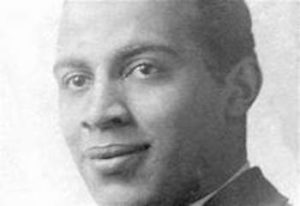
Richard B.Nugent
Richard Bruce Nugent was born on this date in 1906. He was a Black Gay and Bisexual writer.
From Washington, DC, he was born into a family with a high social position in the Black community. His mother was an accomplished pianist who had been trained as a schoolteacher, and his father was a Pullman porter. Richard Bruce Nugent attended public grade schools and Dunbar High School. Nugent was a frequent member of Georgia Douglas Johnson’s artistic salon, where writers and intellectuals congregated in Washington. It was at one of those artistic gatherings that he met Langston Hughes. They immediately became the best of friends. Hughes and other writers encouraged and supported Nugent’s literary and artistic efforts throughout the Harlem Renaissance.
Shadows, Nugent’s first published poem, was rescued from the trash by Hughes and was eventually sent to Opportunity magazine, which was reprinted in Countee Cullen’s Caroling Dusk (1927). Alain Locke’s, The New Negro (1925) contained Nugent’s first published short story Sadhji. This story came about when Locke asked Nugent to write a brief explanation of his drawing of a young African woman. The narrative ended up being more useful than the graphic that Nugent had done. Locke continuously encouraged Nugent in his artistic endeavors, as they were connected through family. During the summer of 1926, Nugent was part of a group of Black artists who envisioned a literary periodical to break with the (then) Black literary establishment.
This quarterly was known as Fire!! His creative involvement included two brush and ink drawings and a short story, Smoke, Lilies, and Jade. This short story was the first literary work on a purely homosexual theme published by a Black periodical. By today’s standards, Smoke, Lilies, and Jade's treatment of same-sex encounters is mild. To convey his message effectively in the short story, Nugent employs ellipses throughout the narrative. In electing to use elliptical structures to emulate speech and thought processes, he aimed to estimate actual speech, incorporating short and long pauses to reflect a more natural speech pattern. Nugent was also involved with a second magazine undertaking. In 1928, he served as associated editor of Harlem: A Forum of Negro Life. The only issue of Harlem was published in November 1928.
Nugent wrote the theater reviews; he did not follow the usual expectations and norms of a society that he felt created restrictive boundaries. In his own words, he stated that he was always called flamboyant. Despite his modest literary and artistic output and the equally small amount written about his life, Richard Bruce Nugent was a principal player in the New Negro movement. His unique and unconventional personal style and sexual conventions upset the established mores of the time. Nugent’s lifestyle was that of the ultimate bohemian. Due to the notoriety surrounding him and to avoid embarrassment to his family, he assumed the pseudonym Richard Bruce. It is this alias that is often attached to his writings and drawings. He has been described as a “bizarre and eccentric vagabond poet” and “a nonconformist who refused to accept so-called middle-class standards.”
Other attributes used to describe him were “cutting, good-looking, great sense of humor, and intelligent.” In 1952, Nugent married Grace Elizabeth Marr. He admits without hesitation that his love for her was not a physical love or lust. They were married for seventeen years. Grace died of ovarian cancer in 1969, and Nugent of congestive heart failure seventeen years later in 1987. At the time of his death, he was living in Hoboken, New Jersey.
The African American Desk Reference
Schomburg Center for Research in Black Culture
Copyright 1999 The Stonesong Press Inc. and
The New York Public Library, John Wiley & Sons, Inc. Pub.
ISBN 0-471-23924-0
(Richard Bruce Nugent: Photo by Thomas H. Writh)